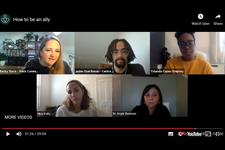Much of the sector is “still finding it difficult to move beyond tokenistic gestures” when it comes to centring the voices of marginalised groups and the communities it works with, fundraisers have heard.
Jaden Osei-Bonsu, programme manager at the leadership development community interest company the Centre for Knowledge Equity, told delegates at the Chartered Institute of Fundraising’s annual convention that the sector needed to shift power to the communities it supported, rather than telling them how to solve their problems.
Speaking at the online convention during an event focusing on how to be an ally to marginalised groups, Osei-Bonsu also called for larger charities to think about how they could work in genuine partnership with grassroots organisations which allowed them to lead programmes, rather than simply advising.
“Historically with the charity sector, fundraising usually puts communities in a position where they are being researched or people are trying to tell them what is going to solve their problems,” Osei-Bonsu said, adding that the conversation should be about shifting power to communities with direct experience of the issues being addressed.
“The sector loves to use key terms like ‘asset-based’, ‘co-produce’ and ‘lived experience’, but I find the majority are still finding it difficult to move beyond tokenistic gestures towards a more meaningful space.”
He said the sector needed to look at how it could “create room for marginalised communities and move beyond participation and get them to lead the work directly”.
Organisations needed to understand what role they could play in elevating grassroots groups with more experience in a particular area – through joint bids for funding, for example – but needed to ensure they were working in genuine partnership.
“We’re looking at equal ownership of the programme rather than bringing in community organisations just to deliver a part of it,” he said.
His fellow panellist Yolanda Copes-Stepney, founder of Speak & Do, which represents actors and speakers, said that when engaging with marginalised communities, organisations needed to make a conscious effort to ask what results the communities wanted to see from the engagement.
Drawing on her experience in youth work, she said too often the young people she spoke to had believed nothing would come from their involvement and they would not be listened to
“You have to speak to young people and ask why they wouldn’t want to be involved and make it desirable for them to do so,” she said.
“It’s about asking them lots of questions – you can’t assume anything for them.”
She also said organisations and individuals needed to remember that allyship and supporting marginalised groups was “going to be a constant process of learning”.
